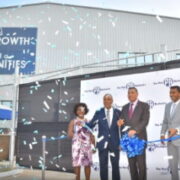CARICOM leaders open annual summit overshadowed by the continuing unfolding events in Haiti
Black Immigrant Daily News
Caribbean Community (CARICOM) leaders began their 44th regular summit in Nassau on Wednesday night overshadowed by the continued deterioration of the situation in the French-speaking member country of Haiti, pledging also to find a solution to the political and socio-economic problem there.
“The situation in Haiti requires our urgent attention. The turmoil and suffering there continue to worsen. As a near neighbour, the Bahamas is under great strain and many other countries in our region are already heavily impacted,” Bahamas Prime Minister Phillip Davis told the opening ceremony of the summit.
Davis, who is the chairman of the 15-member regional integration grouping, said the region would benefit “if Haiti is again fully functioning as a state.
“We should learn from the failures of past efforts to help rather than use these disappointments as an excuse for inaction. I pray that we can agree on a series of concrete steps to help move towards a solution for the Haitian people and the region as a whole,” Davis told the audience that included Haitian Prime Minister Dr Ariel Henry and Canada’s Prime Minister Justin Trudeau, who has pledged his country’s support in finding a solution to the situation.
“We have learnt that inaction has its own costs and consequences,” Davis added.
Earlier, outgoing CARICOM chairman and Suriname’s President, Chandrikapersad Santokhi, said Haiti “is in need of our concrete, and feasible assistance.
“We must support the Haitian people. Building on our discussions in the past year, I look forward to how and in what way this assistance can be provided. Democracy, free and fair elections, rule of law and certainly the protection of fundamental human rights are indeed at the core of the Caribbean civilisation,” Santokhi said, adding “we must foster and protect these also in the sister nation in need”.
CARICOM Secretary General, Dr Carla Barnett told the ceremony that even as progress is being made on some fronts, CARICOM and the wider international community continue to struggle to help Haiti resolve its multifaceted crises.
“We will continue our efforts to assist all stakeholders in Haiti to ensure a Haitian-owned resolution to the crises,” she said, adding “we will have to show the resilience and fortitude of the Haitian people, as we strive to overcome challenges and advance the initiatives to improve the lives of all citizens of our Caribbean Community.
“That goal – to create a safe, sustainable, prosperous and viable Community for all – has been the guiding principle of our efforts over the last 50 years, and will continue to guide us over the next 50 and beyond,” she added.
Haiti’s prime minister has called on the international community, “especially those countries that can help” to support efforts to deal with the ongoing socio-economic and political situation in his country.
Prime Minister Henry, who succeeded the assassinated President Jovenel Moise, as head of the government in July 2020, has said to deal with this situation, his administration is urging the international community to participate in a specialised multinational force to help the Haitian security forces to fight against the proliferation of organised crime, the illicit trafficking of arms and ammunition, and eradicate the gangs that have held the country hostage.
United Nations Secretary General, Antonio Guterres reiterated his urgent appeal to member states to understand the urgency of acting quickly to support the solutions chosen by Haitian actors.
So far, Jamaica is the only CARICOM country that has publicly said it is “willing to participate in a multinational security assistance deployment to Haiti” which is going through a period of political turbulence and economic and social difficulty, aggravated by a climate of insecurity fuelled by armed criminal groups.
The Caribbean leaders will over the two days discuss a wide range of issues, ranging from climate change to food security and the impact of the ongoing COVID-19 pandemic.
Prime Minister Davis said that the pandemic had taught the region a valuable lesson “about what’s important and about what we need to do to save lives and livelihood”.
Donate At Caribbean News Service, we do not charge for our content and we want to keep it that way. We are seeking support from individuals and organisations so we can continue our work & develop CNS further.
NewsAmericasNow.com




Leave a Reply
Want to join the discussion?Feel free to contribute!